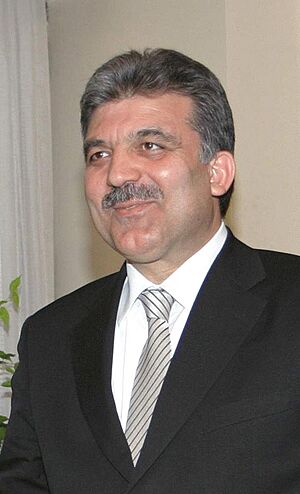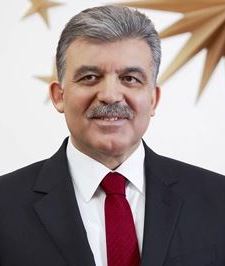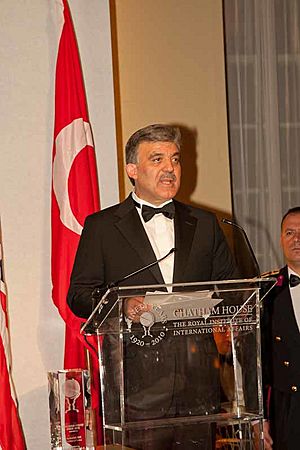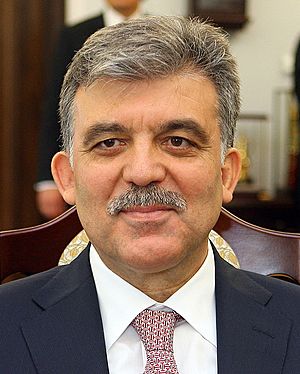Abdullah Gül facts for kids
Quick facts for kids
Abdullah Gül
|
|
|---|---|
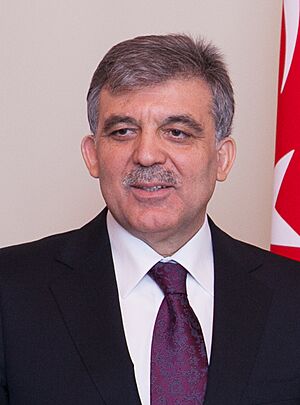
Gül in 2013
|
|
| 11th President of Turkey | |
| In office 28 August 2007 – 28 August 2014 |
|
| Prime Minister | Recep Tayyip Erdoğan |
| Preceded by | Ahmet Necdet Sezer |
| Succeeded by | Recep Tayyip Erdoğan |
| 24th Prime Minister of Turkey | |
| In office 18 November 2002 – 14 March 2003 |
|
| President | Ahmet Necdet Sezer |
| Deputy | Abdüllatif Şener Mehmet Ali Şahin Ertuğrul Yalçınbayır |
| Preceded by | Bülent Ecevit |
| Succeeded by | Recep Tayyip Erdoğan |
| Deputy Prime Minister of Turkey | |
| In office 28 March 2003 – 28 August 2007 |
|
| Prime Minister | Recep Tayyip Erdoğan |
| Served with | Abdüllatif Şener Mehmet Ali Şahin |
| Preceded by | Ertuğrul Yalçınbayır |
| Succeeded by | Cemil Çiçek |
| Minister of Foreign Affairs | |
| In office 14 March 2003 – 28 August 2007 |
|
| Prime Minister | Recep Tayyip Erdoğan |
| Preceded by | Yaşar Yakış |
| Succeeded by | Ali Babacan |
| Minister of State | |
| In office 28 June 1996 – 30 June 1997 |
|
| Prime Minister | Necmettin Erbakan |
| Member of the Grand National Assembly | |
| In office 20 October 1991 – 28 August 2007 |
|
| Constituency | Kayseri (1991, 1995, 1999, 2002, 2007) |
| Personal details | |
| Born | 29 October 1950 Kayseri, Turkey |
| Political party | Independent (2007–present) |
| Other political affiliations |
|
| Spouse |
Hayrünnisa Özyurt
(m. 1980) |
| Children | Ahmed Münir Gül Mehmed Emre Gül Kübra Gül |
| Alma mater | Istanbul University University of Exeter |
| Signature | |
| Website | Official website: https://web.archive.org/web/20140909184646/http://www.abdullahgul.gen.tr/pages/ |
Abdullah Gül (born 29 October 1950) is a Turkish politician. He was the 11th President of Turkey from 2007 to 2014. Before that, he served as Prime Minister for a short time from 2002 to 2003. He was also the Deputy Prime Minister and Foreign Minister between 2003 and 2007.
During his university years, Gül was interested in political ideas based on Islamic beliefs. He became a Member of Parliament for Kayseri in 1991. He was re-elected several times. He was first a member of the Welfare Party, which was later closed down because its activities went against the country's rules about religion and government. He then joined the Virtue Party.
When the Virtue Party split into groups with different ideas, Gül joined Recep Tayyip Erdoğan. They believed in the need for reform and a more moderate approach. In 2001, Gül and Erdoğan started a new party called the Justice and Development Party (AKP). This party aimed to be a moderate conservative group.
Gül became Prime Minister after the AKP won the 2002 general election. At that time, Erdoğan was not allowed to hold political office. Gül's government helped remove this ban, and Erdoğan became Prime Minister in March 2003. After this, Gül served as Minister of Foreign Affairs and Deputy Prime Minister until 2007.
When Gül ran for President, some people who strongly supported keeping government and religion separate were against him. The Constitutional Court at first blocked his election due to worries about his past political background. However, after the 2007 snap general election, he was elected as Turkey's first president with a background in Islamic politics.
As president, Gül faced some criticism for approving laws that some people thought went against the constitution. For example, in 2013, he signed a law that limited alcohol sales. This was seen by some as a reason for the Gezi Park protests. Other laws he approved included stricter internet rules and more government control over judges. During the Gezi Park protests and government corruption scandals, Gül tried to act as a mediator.
Contents
Early Life and Education
Abdullah Gül was born in Kayseri, Turkey, on 29 October 1950. This date is also Republic Day in Turkey. His father, Ahmet Hamdi Gül, was an air force mechanic. His mother is Adviye Satoğlu.
Education and Early Career
Gül studied Economics at Istanbul University. He spent two years in London from 1976 to 1978, studying at the University of Exeter in the United Kingdom. When he returned to Turkey in 1978, he became a teacher at Sakarya University. He also worked on his PhD, focusing on Turkey's economic ties with other Muslim countries. He earned his PhD from Istanbul University in 1983.
From 1983 to 1991, he worked at the Islamic Development Bank (IDB) in Jeddah, Saudi Arabia. He has also received honorary degrees from Amity University, Noida in 2009 and the University of Dhaka in 2010.
Starting in Politics
Gül became interested in politics during his high school years. In university, he joined a student union with nationalist and Islamic ideas.
He was elected to the Turkish parliament for the Welfare Party from Kayseri in 1991 and 1995. During this time, he made some strong statements about Turkey's political system. These statements caused discussion when he ran for president in 2007.
In 1999, he kept his seat in parliament as a member of the Virtue Party. This party was later closed down by the Constitutional Court for going against the constitution. By this time, Gül's views seemed to have become more moderate. He was part of a group of politicians who wanted reforms within the party. In 2001, this group founded the Justice and Development Party (AKP). He was elected to represent Kayseri again in 2002.
In 2002, Gül explained his views on the AKP. He said that the Welfare Party had some members who wanted strict religious rule. He believed that being modern and being Muslim could go together. He also said that the AKP accepted modern ideas like freedom, human rights, and a market economy.
Prime Minister
After the Justice and Development Party (AKP) won the most votes in the November 2002 general election, Gül was chosen as Prime Minister. This happened because the AKP leader, Recep Tayyip Erdoğan, was not allowed to be involved in politics at that time.
Gül's government worked to allow Erdoğan to return to politics. After this was achieved, Erdoğan became Prime Minister on 14 March 2003. Gül then became the Deputy Prime Minister and Foreign Minister.
Foreign Minister
After becoming Foreign Minister in March 2003, Gül played a key role in Turkey's efforts. He worked to get a date for Turkey to join the European Union. He also tried to improve relations with Syria and keep good ties with countries in Central Asia and the Caucasus that speak Turkic languages. In January 2008, Gül visited the United States to meet with President George W. Bush and Secretary of State Condoleezza Rice.
Presidency (2007–2014)
On 24 April 2007, Prime Minister Erdoğan announced that Gül would be the Justice and Development Party's candidate for the 2007 presidential election. There had been talk that Erdoğan himself might run, which had caused strong opposition from people who supported a secular government.
When opposition parties in Parliament boycotted the election, Gül officially withdrew his candidacy on 6 May 2007. However, on 11 May 2007, after changes to the Turkish constitution allowed people to directly elect the president, Gül announced he still planned to run.
After the July 2007 parliamentary election, the AKP again nominated Gül as their presidential candidate on 13 August. The election was held as a vote in parliament. On 14 August, Gül submitted his application and stated his commitment to secularism.
On 28 August 2007, he was elected president in the third round of voting. He was sworn in right away. This event was quite low-key.
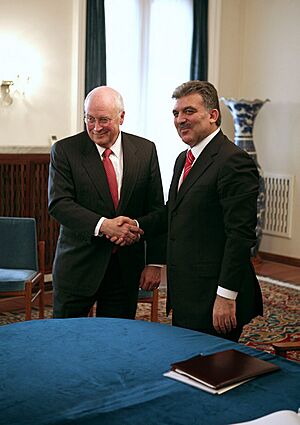
The Chief of the Turkish General Staff did not attend Gül's swearing-in. The opposition Republican People's Party also boycotted it. The transfer of power at the presidential palace happened privately. Gül's wife was not present at the traditional evening reception, which was held in the morning instead, and wives were not invited.
His presidency was seen as a "new era in Turkish politics." This was because he was the first president of Turkey with a background in Islamic politics.
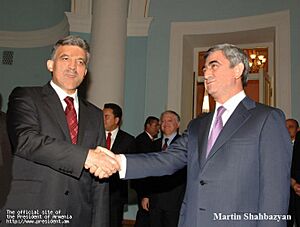
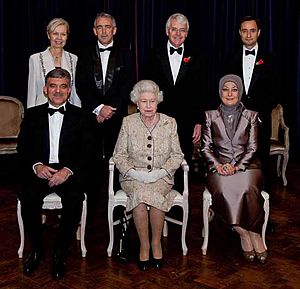
Gül received congratulatory messages from the US, EU, and German authorities. Turkey's Prime Minister Tayyip Erdoğan said that a period of uncertainty had ended.
In September 2008, Gül became the first Turkish leader to visit Armenia. There, he met with President Serzh Sarkisian. They worked on a solution to the difficult issue of the genocide question. This caused a big debate in Turkey, but neither the Armenian nor Turkish parliaments approved the agreement. In November 2011, President Gül made a state visit to the United Kingdom as a guest of Queen Elizabeth II. He met with political and business leaders, visited the Olympic Park, and was honored at a state banquet at Buckingham Palace.
In November 2013, Gül asked Muslim countries to fight against what he called Islamophobia. He spoke at a meeting in Istanbul. He said that Islamophobia is a serious problem that creates unfair ideas about Muslims. He added that terrorism plays a role in these problems. He stressed that people must fight against anything that links terrorism with Islam, which he called a religion of love and tolerance.
After Leaving Office
After leaving office, Abdullah Gül mostly stayed out of politics. He focused on social and cultural issues and charity work. He did not publicly share his political opinions or support any Turkish party or politician. However, during a political crisis and large protests in 2025, he spoke out. The protests were caused by the jailing of Istanbul mayor Ekrem İmamoğlu. Gül supported İmamoğlu, saying that people should remember the unfairness that he and President Recep Tayyip Erdoğan once faced. He stated that such mistakes should not be made against Ekrem İmamoğlu, who was chosen by the people.
Views on the Middle East
After the Israeli action on the MV Mavi Marmara in 2010, Gül suggested ending diplomatic relations with Israel. He said that Israel would become like an apartheid state if it did not allow an independent Palestinian state. He believed that working for a fair peace was in Israel's own best interest.
On 31 December 2012, he spoke about the Arab spring and the move towards democracy in Arab countries. He said that democracy is more than just elections. He stressed that these countries still needed to create important democratic systems, like the rule of law, accountability, gender equality, and freedom of speech and religion.
Titles Held
- 1949–1983: Abdullah Gül
- 1983–1991: Dr. Abdullah Gül
- 1991–1996: Assoc. Prof. Dr. Abdullah Gül, MP
- 1996–1997: Assoc. Prof. Dr. Abdullah Gül, Minister of State of Turkey
- 2002: His Excellency Assoc. Prof. Dr. Abdullah Gül, Prime Minister of Turkey
- 2002–2007: His Excellency Assoc. Prof. Dr. Abdullah Gül, Deputy Prime Minister and Minister of Foreign Affairs of Turkey
- 2007–2014: His Excellency Assoc. Prof. Dr. Abdullah Gül, President of the Republic of Turkey
Awards and Honors
National Honors
| Ribbon bar | Award or decoration | Country | Date | Place | Note | Ref. |
|---|---|---|---|---|---|---|
| Medal of Honor of the Republic of Turkey | 28 August 2014 | Ankara |
Foreign Honors
| Ribbon bar | Award or decoration | Country | Date | Place | Note | Ref. |
|---|---|---|---|---|---|---|
| Pro Merito medal by European Council | 2002 | Brussels | ||||
| Member 1st Class Order of Abdulaziz Al Saud | 9 November 2007 | Ankara | The order was named after Abdulaziz Al Saud. | |||
| Honorary Knight Grand Cross of the Order of the Bath | 13 May 2008 | Ankara | British order of chivalry. | |||
| Medal "10 years of Astana" | 4 July 2008 | Astana | ||||
| Grand Cordon of the Order of Independence | 17 August 2009 | Istanbul | ||||
| Grand Collar of the Order of Prince Henry | 12 May 2009 | Ankara | Portuguese National Order of Knighthood. | |||
| Knight Grand Cross with Collar of the Order of Merit of the Italian Republic | 17 November 2009 | Ankara | The highest ranking honor of the Italian Republic | |||
| Collar of the Order of Mubarak the Great | 21 December 2009 | Kuwait City | ||||
| 2010 Chatham House Prize | 20 March 2010 | London | Gul awarded "Statesman of the Year" by Queen Elizabeth II. | |||
| Grand Cordon of the Order of Valourf | 16 March 2010 | Yaoundé | Second highest order in Cameroon. | |||
| Nishan-e-Pakistan | 31 March 2010 | Islamabad | Pakistan's highest civil order. | |||
| Grand Cross with Chain Order of Merit of the Republic of Hungary | 15 November 2011 | Ankara | The highest state order and second class of Hungary. | |||
| Knight Grand Cross of the Order of the Netherlands Lion | 16 April 2012 | Amsterdam | Netherlands' Lion, established in 1815. | |||
| Recipient of the Order of the Golden Eagle | 11 October 2012 | Ankara | The highest decoration of Kazakhstan. | |||
| Knight of the Order of the Seraphim | 11 March 2013 | Stockholm | The highest order awarded by Swedish Royalty | |||
| Member of St. George's Order of Victory | 19 April 2013 | Ankara | Second highest state decoration awarded by President of Georgia. | |||
| Recipient of the Star of President Order | 29 May 2013 | Ashgabat | The first order given to foreign president in Turkmenistan. | |||
| Grand Cross with Collar of Order of St. Olav | 5 November 2013 | Ankara | The highest ranking honor of the Kingdom of Norway. | |||
| Recipient of the Heydar Aliyev Order | 12 November 2013 | Ankara | The highest national order of Azerbaijan. | |||
| Knight of the Order of the Gold Lion of the House of Nassau | 18 November 2013 | Ankara | The highest national order in Luxembourg. | |||
| Magtymguly International Prize | 3 June 2014 | Ankara | ||||
| Recipient of the Order of the State of Northern Cyprus | 19 July 2014 | Northern Nicosia | The highest national order in Turkish Republic of Northern Cyprus. | |||
| Recipient of the Danaker Order | 8 September 2014 | Istanbul | The highest national order in Kyrgyzstan. |
See also
 In Spanish: Abdullah Gül para niños
In Spanish: Abdullah Gül para niños
- Çankaya Köşkü
- List of presidential trips made by Abdullah Gül
- Abdullah Gül University
- Abdullah Gül Interchange
 | Ernest Everett Just |
 | Mary Jackson |
 | Emmett Chappelle |
 | Marie Maynard Daly |


